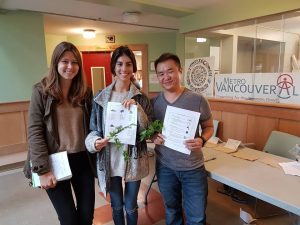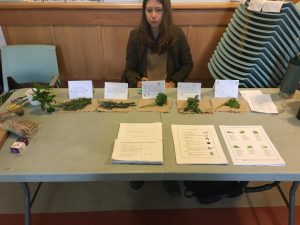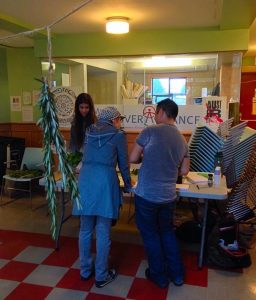Welcome back! Let us begin by presenting you with a thought provoking question, which will become clear as you read through our blog and why we want you to keep this question in the back of your mind…
When life presents you with an seemingly impossible challenge or obstacle, what is your instinctual response? Do you throw your hands into the air and surrender? Do you forge ahead with your tried and proven ways? Do you look for new ways to tackle the challenge?
Think about what YOU would do and see how it compares to what we would do!
Our Proposal
First off, as promised, we are revealing our project proposal for your viewing pleasure. Click on the sunflower below to read it!
We would love to hear what you think about our proposal so feel free to leave a comment below and let us know.
Weekly Objectives
The time frame for this project from start to finish will be close to three months. Below are our weekly objectives for this project.
- Communicate our workshop plan and ideas with our primary contact Susanna in order to ensure that it is achievable and relevant to Gordon Neighborhood House
- Use collected data from workshop #1 on friday in order to produce a graph and data table that properly articulates the results from our community food hub project in a visual manner in order to illustrate and evaluate the effectiveness of our workshop.
- Designate particular roles of the second and final workshop regarding who is going, what supplies to purchase, and details of the workshop we will be executing in order to provide the most effective and valuable assistance to the community
- Designate roles regarding the Final Community Project Report in terms of which member is completing what section of the paper.
Our Accomplishments
Setting weekly objectives is one of the critical steps to a successful project. However, seeing each objective come to fruition is a fulfilling aspect. Below is a summary of our achievements to date.
- Despite some uncertainty, we successfully completed our first workshop on drying herbs. We received some useful data, observations, and feedback to apply to our next workshop, and everyone who filled out a feedback form said they found the workshop beneficial/helpful! We also quantified the data and will soon use it to make some visual representations.

Wrapped up our first workshop on October 7th!
- We revisited how many workshops we will put on and decided to put on two instead of three, and set our second workshop on food storage for preservation on November 4th.
A Moment of Reflection
LFS 350 is a course unlike any other. It allows us to think critically about many important issues and it challenges us by giving us the opportunity to utilize our knowledge and skills to address an issue in the community. However, sometimes, the challenges lie within us and make us thinking deeply about how we can turn lemons into lemonade. So I hope you have given the question we presented to you in the beginning of our blog some thought. We will now tell you about an obstacle that we have encountered thus far and what we did in order to overcome it.
The moment of significance that occurred in the course so far was actually during our first workshop at Gordon Neighbourhood House. Here is a walkthrough of our preservation workshop:
- Participants were given a handout outlining important properties of herbs available during the workshop
- Participants were then given a sample of herbs to dry
- The herbs were then bundled together with either an elastic band or twine and placed in a paper bag. Participants were shown how to cut holes in the bag to allow for ventilation.
- Participants were able to take the herbs that they have worked with to continue the drying process in their homes.
Prior to workshop day, we realized that while we had a great idea as to what we were going to present and the information that we would like to relay to the community members, we were still far from being sure if it would go as planned. Our mental conception of the workshop consisted of us standing in the front of a room presenting our workshop to the community members who would be seated. In addition, we would hold two sessions – one in the morning and one in the afternoon. Of course, the workshop day turned out to be quite different. When we arrived, we found out that we didn’t have a classroom at our disposal for the day, we would be setting up a table in a common hallway area in which individuals would approach us throughout the day. This changed the delivery method of our workshop which was an obstacle that we had to overcome.

Hmmm……
This experience was significant and important in that it afforded us the opportunity to deal with the unexpected. The day started off similar to one trying to navigate a vessel in uncharted waters whereby the new found uncertainty elicited a feeling of both excitement and anxiety inside us (Shulman, 2005). However, we soon realize that once we took a step back and appreciated the surroundings that we were in and the people we were interacting with, it was felt like we suddenly stopped trying to steer the vessel and instead we were riding the currents and appreciating the beauty of our surroundings. We experienced what Tim Hartford (TED, 2016) explained in his Ted Talk in which the obstacle we were presented with allowed us to utilize a very important tool we had at our disposal – our creativity. This came into play when individuals who did not seem very interested in our workshop about drying herbs, became interested when we talked to them individually about how it can improve their health and new ways in which they can use the herbs once dried. This opportunity would not have been afforded to us had our workshop been delivered in a more traditional teacher-student method with less hands-on experience and interaction.

Let’s talk herbs!
Despite the the difference in what we had envisioned our workshop to be and the actual workshop day, we achieved what we had set out to do which was to deliver tangible food literacy skills to the public. Furthermore, our first workshop at Gordon Neighbourhood House was very well received by the community members despite the obstacle presented to us. We were also able to engage in experiential learning by utilizing our combined knowledge and applying it to a real-life practical context (Kolb, 2014). Using this new found knowledge about the logistics of our workshop day, it will help us better plan and deliver our second upcoming workshop.
Our Next Steps
Now that we have one workshop under our belt, it is time for us to prepare for our next one. As such, we have a list of upcoming objectives and our strategies on how to achieve each of them.
- Improve the delivery of the second food literacy workshop.
We have two strategies that we will use to achieve this first objective. Our first strategy is to communicate with Gordon Neighbourhood House and ask them specific questions about what they would like to see us incorporate into the second workshop. Because we come from a different background than our target audience, what we perceive as being important information to educate the community about may not be applicable to their needs. Our second strategy is to analyze the feedback forms that we received from the first workshop and make improvements to the second workshop accordingly. One of the biggest reasons why we have feedback forms is that it helps us to assess the effectiveness of our workshop from the point of view of the community. Both of these strategies will not only inform us of the needs and opinions of the community, but it will also help us achieve our goal to provide effective, tangible food storage and preservation workshop to the community.
- Prepare for our next workshop on food storage.
To achieve this objective, we will be conducting research to find out what the available methods for food storage are. In particular, our emphasis will be on how to prolong the shelf-life of produce products as that is the bulk of the perishable food items that Food Hub individuals are receiving. As a group, we feel that it is important to focus the second workshop on food storage methods to foods that are accessible to the participants because it will be both more applicable to them and hopefully help us improve the efficacy of our workshop.
Another strategy that we will incorporate in our preparation efforts is creating a handout for participants to take home. The handout will contain easy-to-understand, summarized information of what is presented during the workshop. During the first workshop, workshop participants appear to be very receptive to receiving summary handouts that they can take home with them and so we have decided to continue this practice. This strategy is important because we are using our experiences from our first workshop as to what has worked well and applying it to our second workshop.
I In closing, we hope you have enjoyed following our project journey so far. As Lao Tsu (n.d.) famously said, “the journey of a thousand miles beings with a single step.” So we hope that you will continue to accompany us in the upcoming weeks as we our project continues to unfold.
References:
Kolb, D. A. (2014). Experiential learning: Experience as the source of learning and development. FT press.
Shulman, L. S. (2005). Signature pedagogies in the professions. Daedalus,134(3), 52-59.
TED. (2016, February 2). Tim Harford: How frustration can make us more creative [Video File]. Retrieved from https://www.youtube.com/watch?v=N7wF2AdVy2Q
Tsu, L. (n.d.). GoodReads.com. Retrieved September 30, 2016, from GoodReads.com Web site: http://www.goodreads.com/quotes/21535-the-journey-of-a-thousand-miles-begins-with-a-single

